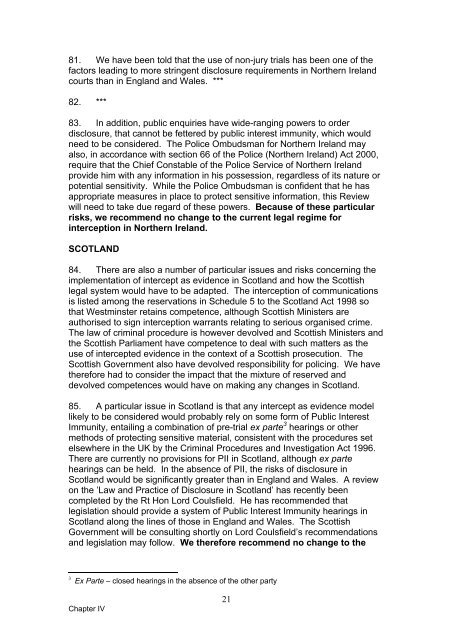Privy Council Review of intercept as evidence: report - Official ...
Privy Council Review of intercept as evidence: report - Official ...
Privy Council Review of intercept as evidence: report - Official ...
You also want an ePaper? Increase the reach of your titles
YUMPU automatically turns print PDFs into web optimized ePapers that Google loves.
81. We have been told that the use <strong>of</strong> non-jury trials h<strong>as</strong> been one <strong>of</strong> the<br />
factors leading to more stringent disclosure requirements in Northern Ireland<br />
courts than in England and Wales. ***<br />
82. ***<br />
83. In addition, public enquiries have wide-ranging powers to order<br />
disclosure, that cannot be fettered by public interest immunity, which would<br />
need to be considered. The Police Ombudsman for Northern Ireland may<br />
also, in accordance with section 66 <strong>of</strong> the Police (Northern Ireland) Act 2000,<br />
require that the Chief Constable <strong>of</strong> the Police Service <strong>of</strong> Northern Ireland<br />
provide him with any information in his possession, regardless <strong>of</strong> its nature or<br />
potential sensitivity. While the Police Ombudsman is confident that he h<strong>as</strong><br />
appropriate me<strong>as</strong>ures in place to protect sensitive information, this <strong>Review</strong><br />
will need to take due regard <strong>of</strong> these powers. Because <strong>of</strong> these particular<br />
risks, we recommend no change to the current legal regime for<br />
<strong>intercept</strong>ion in Northern Ireland.<br />
SCOTLAND<br />
84. There are also a number <strong>of</strong> particular issues and risks concerning the<br />
implementation <strong>of</strong> <strong>intercept</strong> <strong>as</strong> <strong>evidence</strong> in Scotland and how the Scottish<br />
legal system would have to be adapted. The <strong>intercept</strong>ion <strong>of</strong> communications<br />
is listed among the reservations in Schedule 5 to the Scotland Act 1998 so<br />
that Westminster retains competence, although Scottish Ministers are<br />
authorised to sign <strong>intercept</strong>ion warrants relating to serious organised crime.<br />
The law <strong>of</strong> criminal procedure is however devolved and Scottish Ministers and<br />
the Scottish Parliament have competence to deal with such matters <strong>as</strong> the<br />
use <strong>of</strong> <strong>intercept</strong>ed <strong>evidence</strong> in the context <strong>of</strong> a Scottish prosecution. The<br />
Scottish Government also have devolved responsibility for policing. We have<br />
therefore had to consider the impact that the mixture <strong>of</strong> reserved and<br />
devolved competences would have on making any changes in Scotland.<br />
85. A particular issue in Scotland is that any <strong>intercept</strong> <strong>as</strong> <strong>evidence</strong> model<br />
likely to be considered would probably rely on some form <strong>of</strong> Public Interest<br />
Immunity, entailing a combination <strong>of</strong> pre-trial ex parte 3 hearings or other<br />
methods <strong>of</strong> protecting sensitive material, consistent with the procedures set<br />
elsewhere in the UK by the Criminal Procedures and Investigation Act 1996.<br />
There are currently no provisions for PII in Scotland, although ex parte<br />
hearings can be held. In the absence <strong>of</strong> PII, the risks <strong>of</strong> disclosure in<br />
Scotland would be significantly greater than in England and Wales. A review<br />
on the ’Law and Practice <strong>of</strong> Disclosure in Scotland’ h<strong>as</strong> recently been<br />
completed by the Rt Hon Lord Coulsfield. He h<strong>as</strong> recommended that<br />
legislation should provide a system <strong>of</strong> Public Interest Immunity hearings in<br />
Scotland along the lines <strong>of</strong> those in England and Wales. The Scottish<br />
Government will be consulting shortly on Lord Coulsfield’s recommendations<br />
and legislation may follow. We therefore recommend no change to the<br />
3 Ex Parte – closed hearings in the absence <strong>of</strong> the other party<br />
Chapter IV<br />
21
















